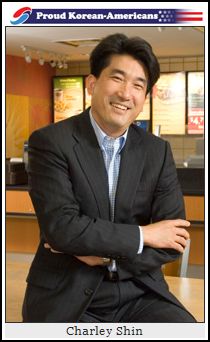rachel56 sent in a fascinating story. Charley’s Grilled Subs is a super-successful franchise with locations in 16 countries. The restaurant specializes in Philly-style cheese steaks. If you go to their website and watch the video telling Charley’s story (here), this guy plays Charley:
But, in fact, that’s not Charley. This is:
So here we have a Korean-American owner of a business that is Philadelphia themed. I’m going to assume, and feel free to call me out on this, that he decided to portray “Charley” as white because he (or his marketers) imagined that Americans (whoever they are) think like this: Philly = America = white. The idea that Charley is Korean might cause cognitive dissonance. Cognitive dissonance is the state of holding two contradictory thoughts at the same time, such as Charley = Philly = America and Charley = Korean, when American does not = Korean.
When I lived in Madison, Wisconsin, I used to frequent a fast food noodle place called “Chin’s Asia Fresh.” I always wondered if there was really a Chin or if it was a made-up character. According to the website there is a Leeann Chin who, growing up in Canton, China, “learned cooking traditions from her mother and an eye for the best ingredients from her father.” Of course, as is clear from Charley’s story, the “history” sections of restaurants can be fiction so… I guess I still wonder. Of course, it would be advantageous for the Chin’s chain to market itself as authentically Asian, just as it is apparently advantageous for the Charley’s chain to market itself as “authentically” “American” (i.e., white).
All of this is a great example of how image is constrained and enabled by racial and ethnic stereotypes.
Lisa Wade, PhD is an Associate Professor at Tulane University. She is the author of American Hookup, a book about college sexual culture; a textbook about gender; and a forthcoming introductory text: Terrible Magnificent Sociology. You can follow her on Twitter and Instagram.


Comments 34
Leslee Beldotti — April 8, 2010
According to the article in the Korean Times, the basic elements of the story presented on the company's "History" video are correct. They just changed the image of Charlie into a goofy white guy.
Which I find quite unfortunate. I would be WAY more intrigued by a sub sandwich created by a Korean-American person.
I find traditional "American" food to be pretty darn boring.
Alan — April 8, 2010
Just a thought: "Charley" might have been seen as problematic, given the military slang for the Viet Cong, and the assumed tendency of the American public to lump all "asians" into the same category.
tl — April 8, 2010
Charlies' whole concept is odd, given that it is "the largest Philly cheesesteak chain in the US" yet has little to do with Philadelphia. As a Philly native I'd never heard of them until I moved to New York (and am surprised to find that they actually do have 1 location in Philly-- in a mall). Cheesesteaks are (in my mind) associated with Italian-Americans in South Philadelphia, but the "generic white guy" they picked to play Charlie doesn't look Italian at all and isn't from Philly.
By the way, Philadelphia has a black plurality (it's 43% black and 41% white as of 2008 census estimates), and maybe I'm giving people too much credit, but I'd assume that Americans associate the city with African Americans and ethnic whites such as Italians (think Will Smith and Rocky Balboa), not with "American," which you're reading as "generic white." Reading this marketing campaign as "Philly = American" and American does not = Korean" is way too reductionist. An odd marketing campaign, but that feels like reaching.
lexiphanic — April 8, 2010
For what it's worth, I've met Leeann Chin, and she really is from China. Or was, I should say, as she recently passed away. I've no doubt her history is romanticized for the web site, but there's some truth at its core.
AJD — April 8, 2010
(Also, they're not called "subs" in Philly. Cheesesteaks are called cheesesteaks, and subs are called hoagies. Having a Philly-themed store with "subs" in the name makes no sense.)
larry c wilson — April 8, 2010
But are the cheesesteak subs any good?
Sue — April 8, 2010
America is fascinating and sad. For whatever it's worth, Charley Shin doesn't look at all Vietnamese to me, but I can't say that everyone would make that distinction. And even if he were, Vietnam was a long time ago, and we shouldn't have been there.
Typing teacher Mavis Beacon is not a real person. I suspected it, and one day looked it up.
http://ecx.images-amazon.com/images/I/51WWZR91R2L.jpg
Duff — April 8, 2010
Excellent example of the complexities of "authenticity" in society and culture.
Carla — April 8, 2010
I have nothing to add other than the fact that I'd much rather buy the product if Charley was selling it instead of "Charley."
rachel56 — April 8, 2010
Awesome post! :) I simply found that video fascinating because though the story is pretty much correct, his image is completely changed. Unless you did research, you would never know that Charley is Korean by checking out the company's website. Thanks for posting this.
EM Jones — April 8, 2010
I think it's not only a race issue, it's a class issue: the white guy caricature is meant to appear working class.
Deepa — April 24, 2010
I'd just like to point out that Charley is not "Korean-American" as asserted in the above post, but in fact simply Korean. He did immigrate. I'm not sure why the photo says "Proud Korean-Americans," unless he identifies as Korean-American because of the large fraction of his life he's spent in the United States.